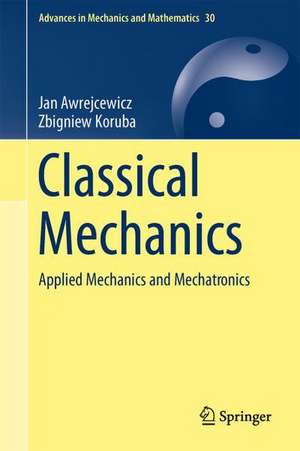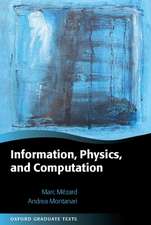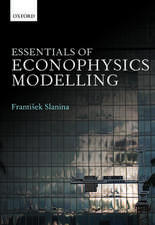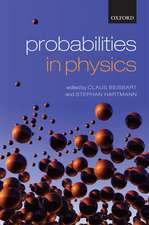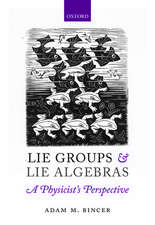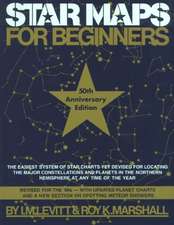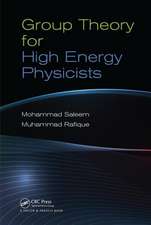Classical Mechanics: Applied Mechanics and Mechatronics: Advances in Mechanics and Mathematics, cartea 30
Autor Jan Awrejcewicz, Zbigniew Korubaen Limba Engleză Hardback – 12 iul 2012
| Toate formatele și edițiile | Preț | Express |
|---|---|---|
| Paperback (1) | 695.70 lei 6-8 săpt. | |
| Springer – 23 aug 2016 | 695.70 lei 6-8 săpt. | |
| Hardback (1) | 700.61 lei 6-8 săpt. | |
| Springer – 12 iul 2012 | 700.61 lei 6-8 săpt. |
Din seria Advances in Mechanics and Mathematics
- 24%
 Preț: 782.72 lei
Preț: 782.72 lei - 18%
 Preț: 789.32 lei
Preț: 789.32 lei - 24%
 Preț: 703.36 lei
Preț: 703.36 lei -
 Preț: 395.47 lei
Preț: 395.47 lei - 18%
 Preț: 1006.06 lei
Preț: 1006.06 lei - 18%
 Preț: 1011.27 lei
Preț: 1011.27 lei - 15%
 Preț: 699.96 lei
Preț: 699.96 lei - 18%
 Preț: 951.91 lei
Preț: 951.91 lei - 18%
 Preț: 1388.36 lei
Preț: 1388.36 lei - 15%
 Preț: 649.54 lei
Preț: 649.54 lei - 18%
 Preț: 1224.68 lei
Preț: 1224.68 lei - 18%
 Preț: 1670.41 lei
Preț: 1670.41 lei - 15%
 Preț: 648.89 lei
Preț: 648.89 lei - 15%
 Preț: 641.85 lei
Preț: 641.85 lei - 15%
 Preț: 695.01 lei
Preț: 695.01 lei - 18%
 Preț: 962.81 lei
Preț: 962.81 lei - 15%
 Preț: 642.51 lei
Preț: 642.51 lei - 18%
 Preț: 968.82 lei
Preț: 968.82 lei - 18%
 Preț: 947.50 lei
Preț: 947.50 lei -
 Preț: 400.85 lei
Preț: 400.85 lei - 20%
 Preț: 559.21 lei
Preț: 559.21 lei - 20%
 Preț: 561.12 lei
Preț: 561.12 lei - 15%
 Preț: 644.18 lei
Preț: 644.18 lei - 24%
 Preț: 790.73 lei
Preț: 790.73 lei - 18%
 Preț: 965.52 lei
Preț: 965.52 lei - 15%
 Preț: 648.24 lei
Preț: 648.24 lei
Preț: 700.61 lei
Preț vechi: 824.25 lei
-15% Nou
Puncte Express: 1051
Preț estimativ în valută:
134.07€ • 140.97$ • 110.77£
134.07€ • 140.97$ • 110.77£
Carte tipărită la comandă
Livrare economică 17 aprilie-01 mai
Preluare comenzi: 021 569.72.76
Specificații
ISBN-13: 9781461439776
ISBN-10: 1461439779
Pagini: 278
Ilustrații: XXI, 250 p.
Dimensiuni: 155 x 235 x 23 mm
Greutate: 0.52 kg
Ediția:2012
Editura: Springer
Colecția Springer
Seria Advances in Mechanics and Mathematics
Locul publicării:New York, NY, United States
ISBN-10: 1461439779
Pagini: 278
Ilustrații: XXI, 250 p.
Dimensiuni: 155 x 235 x 23 mm
Greutate: 0.52 kg
Ediția:2012
Editura: Springer
Colecția Springer
Seria Advances in Mechanics and Mathematics
Locul publicării:New York, NY, United States
Public țintă
GraduateCuprins
Preface.- List of Symbols.- 1. Dynamics in Mechatronic Systems.- 2. Equations of Motion of a Rigid Spherical Body.- 3. Theory of Gyroscopes.- 4. Dynamics and Control of a Gyroscope.- 5. Gyroscopic Control in Self-Guidance Systems of Flying Objects.
Notă biografică
Jan Awrejcewicz is the 2011 winner of the Humboldt Prize. This award is granted from the Alexander von Humboldt Foundation in Germany. The award is based on a reasearcher's entire achievements to date, whose fundamental discoveries, new theories or insights have had significant impact on their own discipline and who are expected to continue producing cutting-edge achievements in the future. Prof. Awrejcewicz is also the main author of “Nonsmooth Dynamics of Contacting Thermoelastic Bodies”, © 2009, Springer (AMMA v. 16), 978-0-387-09562-0. He is also the sole editor of “Modeling, Simulation and Control of Nonlinear Engineering Dynamical Systems”, © 2009 Springer, 978-1-4020-8777-6.
Textul de pe ultima copertă
This is the final volume of a triad of works by Jan Awrejcewicz (this third book with Zbigniew Koruba) devoted to classical mechanics. Classical Mechanics: Mechanics and Mechatronics presents a unique approach to studying mechanical and electromagnetic processes occurring in applied mechanics and mechatronics with emphasis on theory, modeling, and analysis and control of gyropscopic devices, including military applications. This volume address a wide spectrum of graduate students, postgraduate students, researchers, and instructors from the field of mechanics, this volume, and has a strong focus on advanced applications that will be of particular use and interest to engineers and designers practicing in the mechanical/mechatronic industry.
Chapter 1 deals with dynamics in mechatronic systems. Dynamics of a rigid spherical body is studied in Chapter 2 with emphasis on applications. Chapters 3 and 4 are dedicated to the theory, evolution, and dynamics and control ofthe gyroscope and Chapter 5 focuses on gyroscopic control in the self-guidance systems of flying objects.
Chapter 1 deals with dynamics in mechatronic systems. Dynamics of a rigid spherical body is studied in Chapter 2 with emphasis on applications. Chapters 3 and 4 are dedicated to the theory, evolution, and dynamics and control ofthe gyroscope and Chapter 5 focuses on gyroscopic control in the self-guidance systems of flying objects.
Caracteristici
Provides the reader with recent achievements in advanced applied mechanics and mechantronics Includes direct engineering-oriented applications of gyroscopes Contains numerous examples supported by color figures, illustrating theoretical concepts with computational examples? Includes supplementary material: sn.pub/extras
